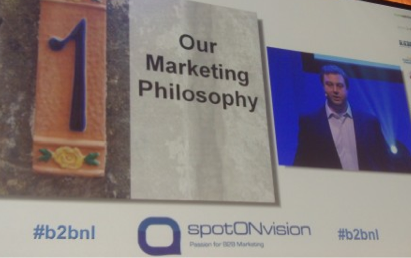In preparation of the B2B Marketing Forum we interviewed one of the keynote speakers, Mike Volpe, CMO at Hubspot. We asked Mike to explain his ‘love story’ as that will be the title of his presentation on March 14th.
If I’m correct, the message -in a nutshell- is to make people love your company and they’ll buy the product. To do so, there are a few ways to make people love you. Create content (blog, video, anything that is interesting) and build and cherish the personal relationship with your customer. Is this correct?
 Mike: “Of course inbound marketing is more complicated than that in practice, but the fundamental flaw with most marketing is that it is based on pressure and coercion, not permission and love. Humans have changed how they live, learn, and shop yet marketing is still stuck in the era where we interrupt people with cold calls and advertisements like we did in 1990. The job of marketing is to increase revenue, but you should use love to do that and respect your customers, not pressure or interrupt them.”
Mike: “Of course inbound marketing is more complicated than that in practice, but the fundamental flaw with most marketing is that it is based on pressure and coercion, not permission and love. Humans have changed how they live, learn, and shop yet marketing is still stuck in the era where we interrupt people with cold calls and advertisements like we did in 1990. The job of marketing is to increase revenue, but you should use love to do that and respect your customers, not pressure or interrupt them.”
The Internet has always been a form of mass media, intended to reach a large audience. Marshall McLuhan and his term ‘the medium is the message’ is well known, but nowadays we see a shift. The message or content, if you like, is becoming more important than the medium, the internet. Is this right?
Mike: “I think the internet is massive, but that does not make it mass media. The internet enables personalization in ways no other media can. Even with 500 TV channels there are still a finite number of choices. Contrast that with YouTube, where there are literally infinite channels because the recommended videos list is personalized to you, or Amazon where the store shelves are personalized just for you and no two people see the same virtual shelf. All companies should figure out how to personalize their website to different parts of their audience to make their marketing more inbound.”
How long will it take before everybody sees the shift? And how long will it take for people to adapt to this different way of thinking and to use it properly?
Mike: “Shifts like this take decades to complete, but the pace of change generally is accelerating – TV spread faster than radio, mobile is spreading faster than the internet. There are much larger benefits to moving soon and being a leader and innovating on your marketing and your business to adapt to today’s buyer.”
We’re always connected to the Internet and it takes only a second to contact somebody on the other side of the world. We’re more global than ever, why is there an urge for the personal relationship? And if a company has a large amount of customers, how can they maintain that personal contact?
Mike: “Global does not mean impersonal, humans are wired to have and build relationships. You are right that having personal relationships with a large number of customers has not been easy. There are ways to use technology (like HubSpot) to have a more personal and more lovable relationship with your prospects and customers without it having to be completely manual. Amazon and NetFlix do it, and every business should.”
Can you tell me something about the difference between this type of marketing versus a salesman who is on the road all day long visiting customers or new prospects and build a personal relationship? Is there a difference?
Mike: “If you can afford to have 1-1 human relationships with every customer, that is great. But most companies can’t do that given how much each customer pays, and more importantly, even if they have a salesman dedicated to them 24×7 customers will still want to use a website or a mobile device to interact. Often it is faster and easier than working with a human.”
Creating content is important. Does every company have to create? I can imagine that big companies can hire people to do so. But for small companies it’s pretty difficult to present themselves properly on twitter/facebook/weblog and to run the company?
Mike: “You have to invest in marketing to grow. Take the money you are wasting on ads in the phone book or print publications or direct mail and hire someone to do inbound marketing and make your company more lovable. Your customers and your income statement will thank you for it.”
How do you know when you have done enough? I guess the answer is: it’s never enough? I’m interested in your views on the next big thing. A few years ago every company needed a facebook account, then they had to use twitter, now everybody has to write a blog or make videos. It can be difficult for companies especially for those companies whose core business is not creative at all? What’s next and what are the best tactics for companies to start with these new challenges? Dive into it? Or be a slow adopter?
Mike: “You don’t have to do anything. You should keep investing until the return is not worth it or you don’t want to grow any faster. If you want to keep growing you need to keep investing and experimenting.”
As I mentioned in the previous question, not everybody is creative. Writing is a skill that not everybody possesses. What is your advice for companies who don’t have a copywriter? Start blogging anyway, learn by trial-and-error or hire somebody to do it for you? However, if you hire somebody, the relationship won’t be personal anymore?
Mike: “I would hire a ghostwriter. Separate the writing ability from the market knowledge and expertise. Media companies are going bankrupt worldwide, you can hire a journalist fairly inexpensively. Have them interview the people in your business that know the most about what you do and can answer the questions most customers have.”
If everybody starts to create, the flow of content is enormous. It will be more difficult to stand out then. How can you stay ahead of the rest? How can one be different in the longer run?
Mike: “The assumption that a huge amount of content will make inbound marketing ineffective is flawed. The shift that has happened is that the customer is now in control, so it is pretty hard to spam someone’s Twitter feed because it requires opt-in (following) by the customer, whereas it is easy to annoy people by phone because you can call them without them opt-ing in.”
What are the topics to write about? Inbound marketing isn’t about creating advertisements in a blog post, but what is interesting for readers? I guess it depends on the company, but how creative do you need to be?
Mike: “Ask your customers. Check your email. People ask your business questions every day. Answer those questions and you’ll have plenty of content for your inbound marketing.”
We live in 2013, but a lot of customers still don’t use the internet. How can you reach them?
Mike: “There is a big digital divide between the developed world and the undeveloped world. If you are selling to the undeveloped world about 1/3 of your customers are online, but with the proliferation of mobile devices I think that will increase quickly. And things like Twitter that can operate through SMS are making even non-internet users more connected.”

